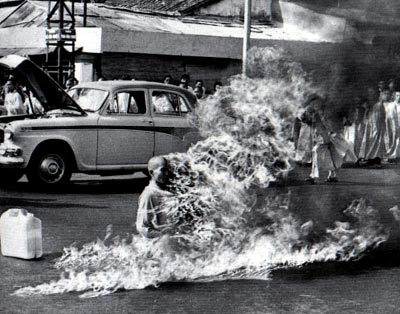A good fried of mine recently wrote a blog entry about the Iraq and Afghanistan Wars and Lara Logan, and linked an article called "America's Paternalistic War Coverage". In the article, Meghan O'Rourke argues that the media have better equipment and are able to show us images of the war faster than they have in past times -which is true- but that they choose to sanitize it in a way they never did in the Vietnam War. I have to say, I think that Slate missed its mark; and did so because it did not examine the historical consequences that came out of showing images of war-torn areas, especially from that particular war.
There are many issues at work here, and a lack of historical knowledge about them on the part of the people writing these articles is disgraceful -and says something about the educational system (and hiring practices) in America today. Some issues lay with the very technology O'Rourke touts as being capable of sending us true images of war -instead of the "Hi, Mom" variety we most often get- instantly. I only have a cursory knowledge of the multiple factors myself; but I knew enough from some college classes, some specials on television, and even one high school class period on the 1960s counterculture movement to know that there is more going on behind the media's decision not to show images of war than what O'Rourke attributes it to. And a quick googling of the subject led me to a fair comprehensible and in-depth article in the Naval War College Review about the delicate balance between the media and the military in war times and how it has changed.
There are some who said we lost the Vietnam War as soon as Walter Cronkite declared the Tete Offensive "unwinnable". There are some who said it was because of that famous image of the flag-draped coffins:
 an image that has been replicated many times and banned outright by the Pentagon in 1991 (and lifted in 2005). Other photographic factors to the fast-spreading unpopularity of the Vietnam war was the image of the children who had been napalmed:
an image that has been replicated many times and banned outright by the Pentagon in 1991 (and lifted in 2005). Other photographic factors to the fast-spreading unpopularity of the Vietnam war was the image of the children who had been napalmed: the monks voluntarily immolating themselves in protest:
the monks voluntarily immolating themselves in protest: and the violent images:
and the violent images: Television news, graphically showing the lives and death of the soldiers, was also a tremendous factor. But what O'Rourke fails to take into account is that this was the first war with a virtual smorgasbord of images, where the press pushed to show aspects of war that the American public had never seen before. And the government noticed what happened when those images were released, recognized how the photos of the dead and dying radically altered public perception of the war in ways simple numbers of the dead and dying and wounded did not. When Life Magazine ran photos of the week's dead, the tide had officially turned.
Television news, graphically showing the lives and death of the soldiers, was also a tremendous factor. But what O'Rourke fails to take into account is that this was the first war with a virtual smorgasbord of images, where the press pushed to show aspects of war that the American public had never seen before. And the government noticed what happened when those images were released, recognized how the photos of the dead and dying radically altered public perception of the war in ways simple numbers of the dead and dying and wounded did not. When Life Magazine ran photos of the week's dead, the tide had officially turned.And that tide took with it the enormous freedom the press had during the Vietnam War. There is a reason the government doesn't want those images shown, a reason why they choose to embed the media where they choose to embed them. There are caveats in place today that weren't in the time of the Vietnam War. In many cases, the media doesn't necessarily choose not to air images altruistically but because they are corporations who fear the consequences. War not being sexy enough, war not being a big seller, isn't the only answer. Part of the answer is that the press is dependent upon the military for material, and that the material that will cause rocky relations between the two groups -and thus less access for the press- is not released. It is a true Catch-22, built not upon paternalism but self-interest. In order to get access to material, the press suppresses material the military would frown upon. Thus, the outcome is the same for the American people whether or not the media is present.
To ignore that the military has some measure over the media, to ignore what media conglomerates get from the government, to ignore the interplay of all of these factors -and to especially ignore that the press' free reign in Vietnam was very much an anomaly and not the norm by any means- is to practice a strange kind of selective amnesia. I am all for calling for more images in the press, of real images that truly show the horror that is taking place. Especially with voices like Lara Logan's calling out for it; especially when the soldiers feel abandoned. But to blame the media's reticence on a paternalistic urge instead of on something even worse -a cowardice- is disingenuous. And it either ignores or never knew the underlying historical issues this present situation encompassed.
No comments:
Post a Comment